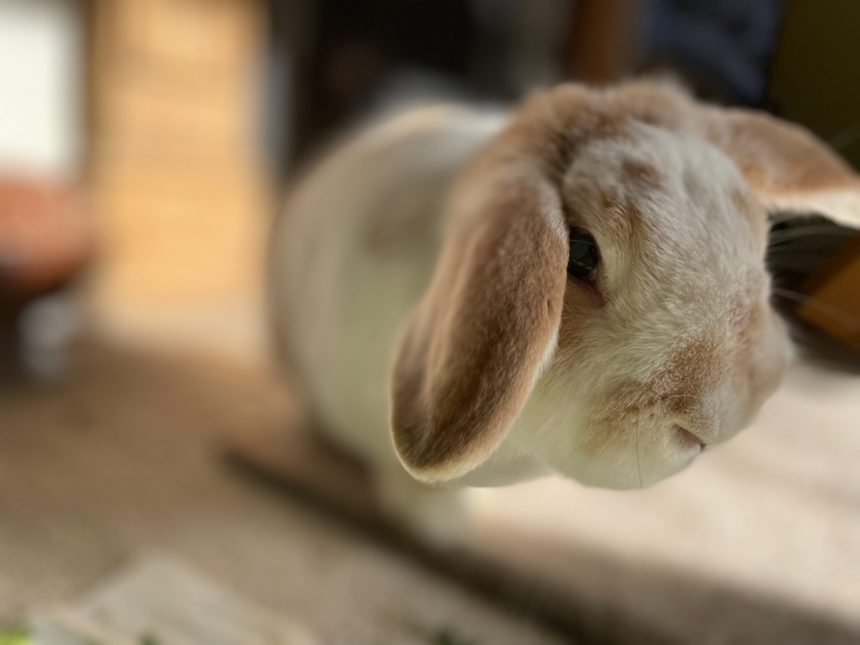Bunnies are without doubt, brilliant, amazing creatures. Cute as you like. And sadly, the most misunderstood of pets. Living with them can be hugely rewarding, full of joyful moments, personality quirks and understanding, but also with a minefield of needs, behaviours and demands!

… are you right for them?
If you’re thinking of getting a bunny for a pet, here’s a few things you should consider..
Bunnies can live 10-12 years or more – they are not here today, gone tomorrow pets. They’re a big commitment.
Bunnies are not solitary creatures – they need to live with at least one bunny partner. A human just isn’t enough in most cases unless you’re at home and spending lots of time with them.
Bunnies are NOT easy children’s pets. As prey animals, being picked up, handled, passed around, dressed up, harnessed etc all work against their natural instincts and causes undue stress. It takes time and patience for them to get to trust being handled (and some just don’t). Rats are much better for kids.
Bunnies are not cheap to keep – they are not a cheaper alternative to a cat or dog. They need jabs at least every 12 months (sometimes as often as every 6). Neutering often costs more than a cat or small dog. They have illnesses you can’t see – they don’t want you to. Add into this housing, the monthly food bill, meds they may need, protecting your home, general bunny maintenance, pet insurance… it all adds up. Some bunnies don’t get ill often. Others do. It’s impossible to tell when that lovely fluff arrives.
Bunnies should not be kept with guinea pigs – this can be quite dangerous for both animals. They have different food requirements, disease risks and social behaviours.
Bunny bonds can be broken if you split them up for any reason and for any length of time. Where possible, take them to the vet together to reduce stress and improve recovery times.
Bunnies won’t pair up with any choice of bunny friend – they will decide if they like the other bunny, not you. If you’re getting bunny a partner, get help – from those with experience eg good bunny rescues, vets or reputable bunny hotel owners. And once they are bonded, don’t split them up. It is hugely stressful to them as it’s effectively like losing a partner. They suffer grief too.
Bunnies need space, not a hutch – they need an appropriate environment in which to live and thrive that appeals to their natural, wild behaviours. At minimum the recommended* space (indoors) is 10ftx6ftx3ft. This may be free range, in their own room or part of a room.
Bunnies like munching while they poo – put hay in their litter tray and change it every day.
Bunnies tend to only be aggressive, or depressed, for a reason – try to work out the cause and do something about it. Be patient – it could take weeks, months for a breakthrough.
Bunnies hide illness. Good owners only need to look at their bunny and they can tell if they are happy or if there is something not right. They can die of shock. They also grieve when their partners die and need, like dogs, to understand they have passed in order to move on.
Bunnies are creatures of habit. As crepuscular animals they are most active morning and evening. They like some change such as moving furniture or environments to keep them stimulated but they don’t react to major change such as being passed around to different families and smells, the introduction of other animals into their spaces, any feeling of insecurity. They don’t like loud sudden noises. Some definitely don’t like fireworks.
Bunnies need hay – and lots of it – it should make up 80% of their diet and be constantly available. They need it to keep their teeth ground down and for a healthy gut. If you are considering an indoor bunny, get used to finding it flying out of your clothing when you undress. Get a good hoover. And bunny proof your house. They’ll think that recharger is a piece of hay…
Carrots and lettuce are not good bunny foods – carrots, fruit etc are high in sugar and both these and lettuce can adversely affect the balance of their gut bacteria. A cup full of greens/herbs (5/6 types) is a recommended amount per day for an average sized bun. Click here for RWAF list. Be careful about calcium content – bunnies can’t regulate theirs, but need some for good bone health.
Avoid muesli type food – instead feed extruded food – ‘nuggets’ – these avoid selective feeding where nutrients could be missed. Bunnies only need an egg cup full twice a day.
Not all vets are well versed in bunnies – they are actually regarded as ‘exotics’. The RWAF have a good bunny list to find one near you.
Bunnies do what bunnies do from a very early age. They can have up to 8 litters a year. Both males and females should be neutered. It will improve theirs and your lives as a result – apart from the obvious avoidance of unwanted kits, litter training is easier, behaviours are more easily managed, and females will have a much better chance of not getting ovarian cancer.
Bunnies shouldn’t be left for long periods of time – they need company, reassurance and stability. It’s even more important for single buns. If you’re going away, find and visit a good bunny hotel or someone reliable who understands their needs to look after them while you’re away.

So if you’re still up for all of this and can commit to giving them the enrichment they need… FABULOUS!! Find out as much as you can, get on some forums, ask questions of people who know. And enjoy those Binkies, you can’t beat them!

